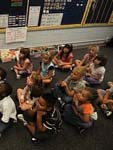







Introduction What About Freire? The Pink Monkey Psst! Wanna Buy A...? And His Pants Are Ugly Conclusions Opinions References and Credits |
While
driving home today thinking about this review, I heard rock musician
Patti Smith being interviewed on National Public Radio’s Fresh Air
about her recent memoir, which has been nominated for the National Book
Award. Smith was speaking with the interviewer, Terry Gross,
about how she’d always been “very comfortable in front of people,” and
illustrated this point with an anecdote from her school days: A teacher
was lecturing on Moby Dick,
and the kids in the class—all
underachievers—were horsing around, firing spitballs around the room,
doing anything but listening to the teacher. Smith herself was,
as she put it, “extremely restless,” so at one point the teacher said
to her, “Patti Lee, if you think you can teach this better than I can,
you get up here and teach it.” Smith:
And I said sure. I was really happy. I went up
there, and I laid
out
Moby Dick for those kids in a way that, like, they comprehended Moby Dick, you know? Well, we can’t all be rock stars. But I’m guessing all of us can picture Smith’s unruly class and classmates—if not necessarily her exegesis of Moby Dick—in our minds, which is part of Ritter’s point. Smith’s story is, for me, instructive, and illustrates what I feel to be the most important point raised in Ritter’s last chapter, “The Work of Teaching in the Age of Online Literacy Reproduction.” By creating their own learning situations outside of school, our students are essentially throwing spitballs, letting us know that what we’re doing isn’t as meaningful to them as it could be. Then how, as teachers, should we address the issue of what may be our own irrelevance? Not, Ritter argues, by superficially adapting technologies or new genres for our own uses in the classroom. Nor will it work to regard students’ engagement with Internet sites as bad behavior—“Don’t mess with stuff that isn’t good for you!”—and try to discipline them out of it. Instead, Ritter challenges us to engage students where they are: to widen our own conceptions of what constitutes literacy, particularly technological literacy; to encourage students to be not just “pupils of rhetoric, but…public rhetoricians in a highly democratic and potentially charged classroom” (p. 169). Her advice to teachers: Be familiar with the technologies; discuss them in class, while being aware that some of students’ opinions may go unvoiced (because, after all, you are not one of them, no matter how hard you might try to be); and, quite frankly, accept the fact that the role of the teacher is changing. How we help shape that new role is only partly up to us. |